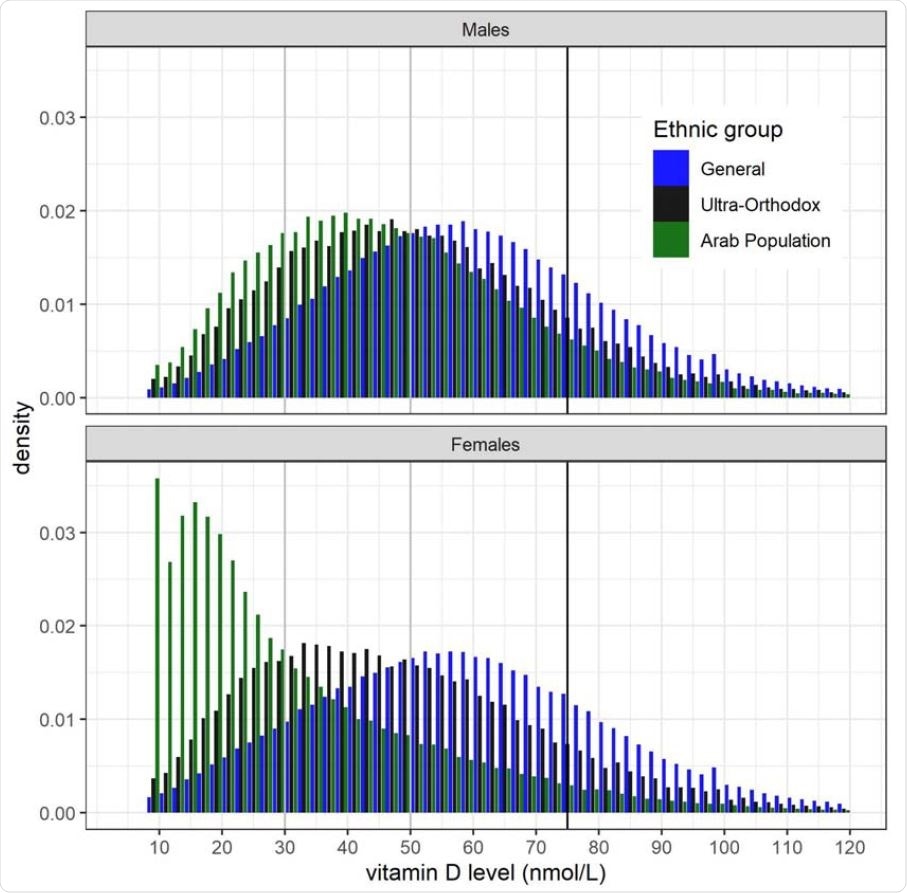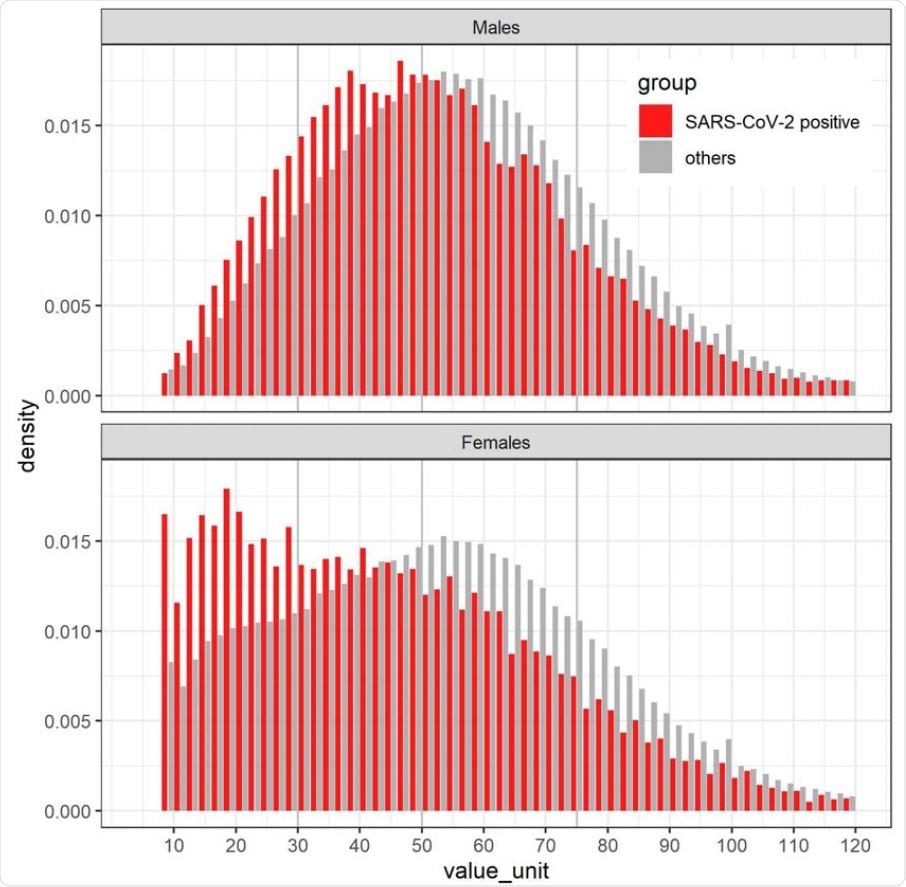Researchers from Israel have found that there could be a link between deficiency of vitamin D and infection with severe acute respiratory syndrome coronavirus 2 (SARS-CoV-2). Their study titled, “The link between vitamin D deficiency and COVID-19 in a large population,” has been released pre-publication at the medRxiv* server.
With over 27.4 million reported cases around the world, the pandemic of COVID-19 caused by the novel coronavirus is raging on. It has so far taken over 896,000 lives. The disease is particularly dangerous for aging and vulnerable populations.
Israel spared
There have been some recent studies that connect vitamin D deficiency with COVID-19 infection and severe disease due to the infection. Studies have shown that in countries where there are higher rates of vitamin D deficiency, there is also a greater prevalence of SARS-CoV-2 infection. The Israeli researchers who conducted this study write that the general population of Israel has been “so far relatively spared by the pandemic” with an infection rate of 0.88 percent equally among men and women.
Men and women
They, however, noted that the rates of infection were higher (3.03 percent) in the Jewish ultra-orthodox population and 1.4 percent among the Arab communities. In these communities, the male-to-female ratio is also varied, they wrote. Among Arab communities, women were far more affected than men (1:1.5 – men: women) and in the ultra-orthodox, men were more affected (1.25:1 – men: women)
Explaining these gender differences, the team writes that the lifestyles and clothing of these communities could allow for a difference in Vitamin d levels among men and women. They wrote that there had been studies showing severe vitamin D deficiency being endemic and common among Arab women. This could be a clue regarding their higher risk of getting COVID-19, the team writes.

Distribution of blood vitamin D levels measured between years 2010-2020 in the three subpopulations in males (upper panel), and females (bottom panel)

 This news article was a review of a preliminary scientific report that had not undergone peer-review at the time of publication. Since its initial publication, the scientific report has now been peer reviewed and accepted for publication in a Scientific Journal. Links to the preliminary and peer-reviewed reports are available in the Sources section at the bottom of this article. View Sources
This news article was a review of a preliminary scientific report that had not undergone peer-review at the time of publication. Since its initial publication, the scientific report has now been peer reviewed and accepted for publication in a Scientific Journal. Links to the preliminary and peer-reviewed reports are available in the Sources section at the bottom of this article. View Sources
What was done?
The Clalit Health Services (CHS) provides healthcare services to over 4.6 million participants whose electronic health records (EHR) are being maintained meticulously. This study was conducted to check the “association between vitamin D levels and Covid-19 incidence, as well as the impact of the purchase of vitamin D supplements on the risk of COVID-19,” the team explained.
Results from the vitamin D tests were collected from the CHS members performed between 2010 and 2019. A relationship was assessed between vitamin D deficiency and Covid-19 incidence in 200 regions. Over the past years, a vast number of men and women had undergone tests to check for their Vitamin D levels. The authors defined vitamin D deficiency as levels below 50 nmol/L and severe vitamin D deficiency as levels below 30 nmol/L. Their records showed that vitamin D deficiency was more common among Ultra-orthodox and Arabs. Aram females were particularly at risk of vitamin D deficiency. Results revealed that 81.5 percent of the individuals tested had vitamin D levels below 50 nmol/L, and 59.1 percent below 30 nmol/L.

Distribution of vitamin D measured in the blood between years 2010-2020 among individuals later infected with SARS-CoV-2 patients and the rest of the population
From the onset of the pandemic till 31st August 2020, a total of 52,537 CHS members had positive RT-PCR tests for SARS-CoV-2. Next, the team also matched 52,405 patients infected with COVID 19, with 524,050 control individuals of the same gender, age, and residence. Their vitamin D tests were also used in the analysis. In the last four months, their use of Vitamin D was also assessed with their chances of getting infected with COVID-19.
What was found?
Results revealed a significant connection between the prevalence of vitamin D deficiency and COVID-19 incidence. This was significant for the female to male ratio for severe vitamin D deficiency, the team found. They wrote, “In the matched cohort, we found a significant association between low vitamin D levels and the risk of Covid-19, with the highest risk observed for severe vitamin D deficiency.” They wrote, “We found a highly significant positive correlation between the proportion of females affected by severe vitamin D deficiency and SARS-CoV-2 incidence, both across the different groups”.
Those that took vitamin D supplements as drops over the last 4 months were found to be protected from the infection.
Conclusions and implications
The authors wrote, “...we have uncovered what appears to be a strong and significant association between low vitamin D levels and the risk of SARS-CoV-2 infection”. They also explained that different communities. The risk was highest among those living in communities with a higher prevalence of the deficiency, they found. They added that to date its had been seen that “northerly latitude is associated with higher mortality rate and hospitalization rate for COVID-19 worldwide”. Vitamin D levels could play a role in this association, as well. They speculated that viruses like the coronavirus could “disrupt the cell junction integrity,” which Vitamin D could help maintain. They added that Vitamin D could help enhance the innate cellular immunity and thus protect from the infection.
The authors concluded that this was one of the most extensive recent studies that looked at the association between vitamin D deficiency and COVID-19 occurrence. It showed that taking the supplements could protect from the infection and reduce incidence among those living in the same geographical regions.

 This news article was a review of a preliminary scientific report that had not undergone peer-review at the time of publication. Since its initial publication, the scientific report has now been peer reviewed and accepted for publication in a Scientific Journal. Links to the preliminary and peer-reviewed reports are available in the Sources section at the bottom of this article. View Sources
This news article was a review of a preliminary scientific report that had not undergone peer-review at the time of publication. Since its initial publication, the scientific report has now been peer reviewed and accepted for publication in a Scientific Journal. Links to the preliminary and peer-reviewed reports are available in the Sources section at the bottom of this article. View Sources
Journal references:
- Preliminary scientific report.
The link between vitamin D deficiency and Covid-19 in a large population Ariel Israel, Assi Albert Cicurel, Ilan Feldhamer, Yosef Dror, Shmuel M Giveon, David Gillis, David Strich, Gil Lavie medRxiv 2020.09.04.20188268; doi: https://doi.org/10.1101/2020.09.04.20188268, https://www.medrxiv.org/content/10.1101/2020.09.04.20188268v1
- Peer reviewed and published scientific report.
Israel, Ariel, Assi Cicurel, Ilan Feldhamer, Felicia Stern, Yosef Dror, Shmuel M. Giveon, David Gillis, David Strich, and Gil Lavie. 2022. “Vitamin D Deficiency Is Associated with Higher Risks for SARS-CoV-2 Infection and COVID-19 Severity: A Retrospective Case–Control Study.” Internal and Emergency Medicine, January. https://doi.org/10.1007/s11739-021-02902-w. https://link.springer.com/article/10.1007/s11739-021-02902-w.